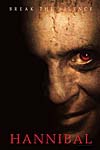Hannibal (R) No Rating
 One of the creepiest villains of modern cinema makes his long-awaited return to dish out a feast of horrors.
One of the creepiest villains of modern cinema makes his long-awaited return to dish out a feast of horrors.
Story
It's been 10 years since America's favorite maneater got away in “Silence of the Lambs” - now we get to see what he's up to a decade later. In this third installment of author Thomas Harris' Hannibal Lecter trilogy, our antihero is living comfortably in Florence, Italy, as an art scholar. Mason Verger, Hannibal's one surviving victim and archenemy, is determined to track him down - Verger wants revenge and he'll pay any amount to get it. When Hannibal gets wind that there's a bounty on his head, he hightails it back to the states to contact old chum FBI agent Clarice Starling. Starling, meanwhile, has been suspended for duty over a questionable police shooting by a corrupt Justice Dept. superior who harbors some serious resentment toward her.
Acting
First, the big question: could Jodie Foster be replaced? The answer: Yep, quite effectively in fact by two-time Oscar nominee Julianne Moore, who affects a subtle accent and never smiles. Although it almost seems as if any actress could have fit the bill -- Clarice is relegated to secondary status to Hannibal and rather than being an active participator in the plot (as Foster was in “Silence of the Lambs”), she's used more as a pawn by everyone else. Suave, refined Anthony Hopkins revels in his shrewd, diabolical portrayal of the villain you love to hate and hate to love - without venturing into camp, he combines a cunning intelligence and wicked cruelty with a barely contained glee. Gary Oldman, in an unbilled performance, is virtually unrecognizable in horrific special effects makeup and though he’s pretty good at being evil, his ugliness almost overwhelms his character and you’re too busy wondering how he manages to talk with no lips to listen to what he's saying.
Direction
Ridley Scott had some sizeable shoes to fill after Jonathan Demme’s haunting masterpiece of a decade ago, but he pulls it off by getting deeper into the characters' mindsets. Hannibal toys with Clarice's mind; he knows her almost better than she knows herself and he's torn between wanting to destroy her and protect her. Scott uses compelling imagery to flesh out Hannibal's true nature; Hannibal manipulates others so well with his power of suggestion that it's almost as if he's the devil come to earth (watch animals slink away from him in fear or his creepy lecture on Dante). Superbly photographed, the disturbing elements of this movie are heightened by the fact that everything is dark - gloomy interiors backlit by whitish light filtered through a window, or rain outside. That the scenery is beautiful is equally unsettling - watch as Verger sits listening to a tape of people screaming in pain as he gazes upon a gorgeous, tree-filled landscape. Intriguingly, the score also helps convey the madness behind Hannibal's superior intelligence - sad, ethereal strains of opera waft behind gruesome, shocking ugliness. Which brings up one important point: This is not, repeat, not for the faint of heart or stomach, and even the heartiest moviegoers may find themselves gagging over the gore, especially the film's appalling final scene when Hannibal serves up a little revenge to the FBI. Whether because he felt he had to live up to expectations or just felt it necessary, Scott just goes there with the graphic imagery and the camera doesn't shy from showing everything in close-up, in-your-face detail.
Bottom Line
A must-see - fans of horror movies will eat this one up.
To get the full Quicklook Films experience, uncheck "Enable on this Site" from Adblock Plus
box office top 10

Civil War Released: April 12, 2024 Cast: Kirsten Dunst, Wagner Moura 11.1M

Abigail Released: April 19, 2024 Cast: Melissa Barrera, Dan Stevens 10.2M

Godzilla x Kong: The New Empire Released: March 29, 2024 Cast: Rebecca Hall, Brian Tyree Henry 9.5M

The Ministry of Ungentlemanly Warfare Released: April 19, 2024 Cast: Henry Cavill, Eiza Gonzalez 9M

Spy x Family Code: White Released: April 19, 2024 Cast: Takuya Eguchi, Saori Hayami 4.9M

Kung Fu Panda 4 Released: March 8, 2024 Cast: Jack Black, Viola Davis 4.6M

Ghostbusters: Frozen Empire Released: March 22, 2024 Cast: Paul Rudd, Carrie Coon 4.4M

Dune: Part Two Released: March 1, 2024 Cast: Timothée Chalamet, Rebecca Ferguson 2.9M

Monkey Man Released: April 5, 2024 Cast: Dev Patel, Sikandar Kher 2.2M

The First Omen Released: April 5, 2024 Cast: Nell Tiger Free, Bill Nighy 1.7M






